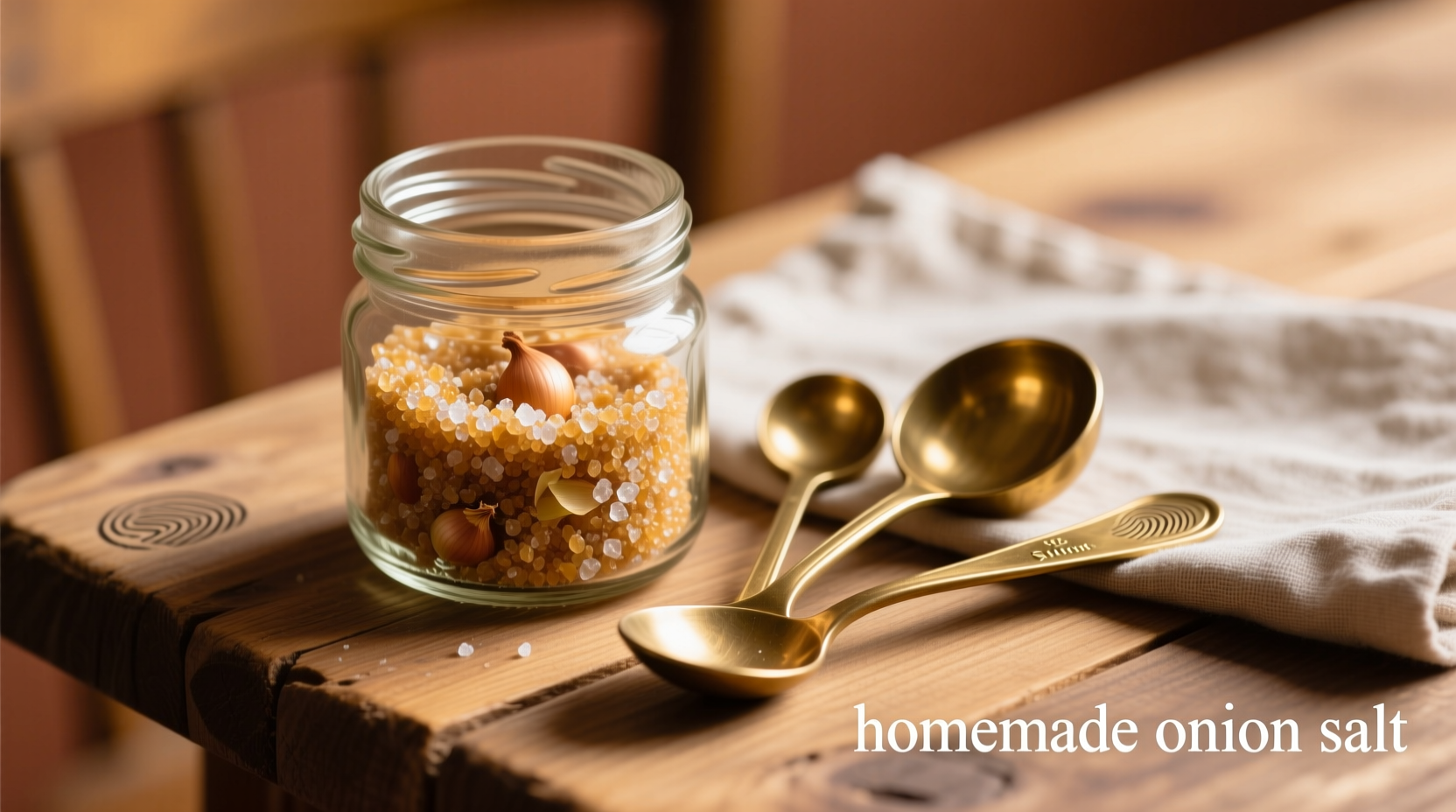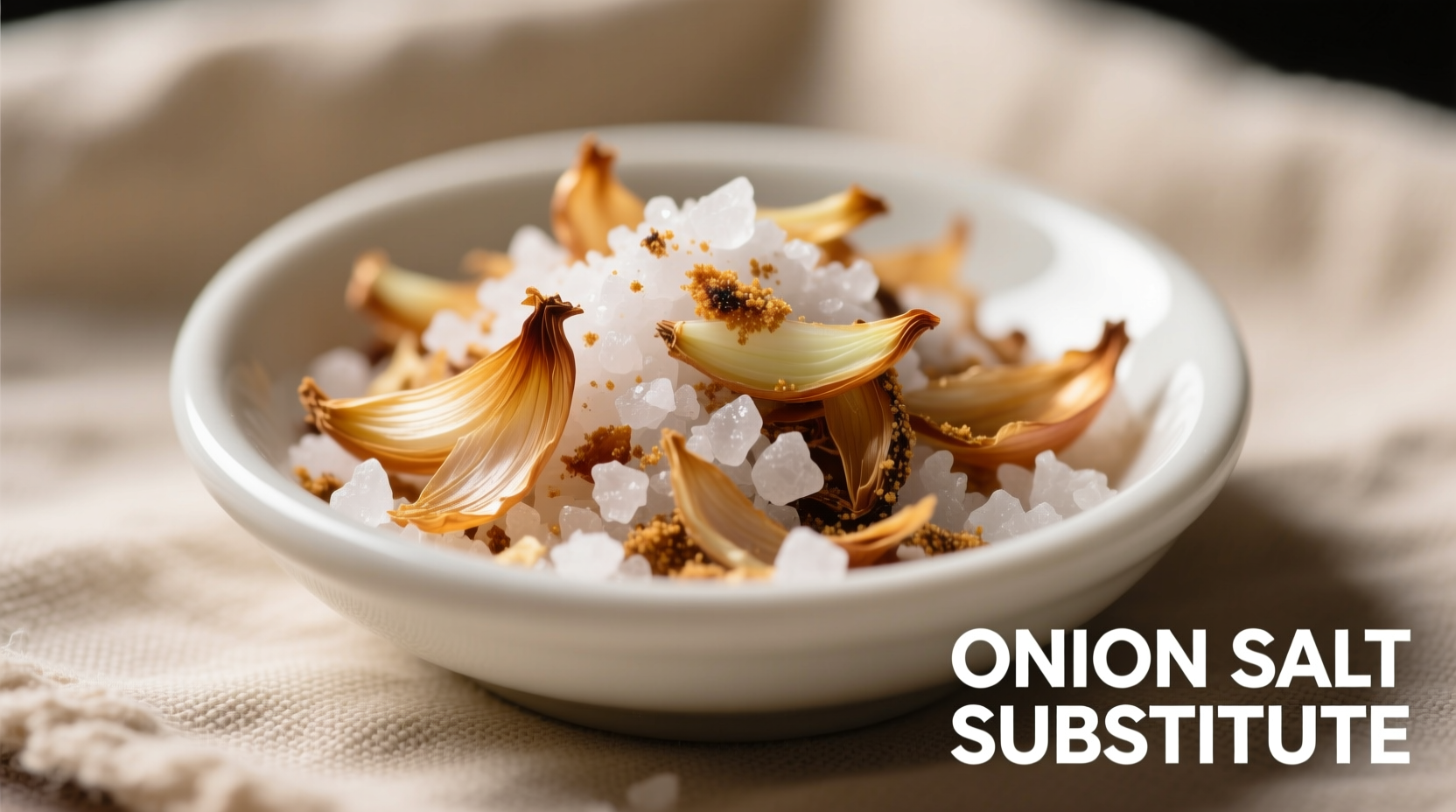Nothing derails a cooking session like reaching for onion salt and finding an empty container. Whether you're seasoning roasted vegetables, crafting the perfect burger rub, or finishing a savory gravy, onion salt's unique flavor profile matters. As a professional chef who's navigated countless kitchen emergencies, I've tested every possible alternative to deliver solutions that actually work—not just theoretical suggestions.
Immediate Pantry Solutions (Right Now Substitutes)
When you're mid-recipe and realize you're out of onion salt, these accessible options save your dish without requiring special trips to the store. The key is understanding the 3:1 ratio principle—onion salt contains approximately three parts onion powder to one part salt.
| Substitute | Ratio (per 1 tsp onion salt) | Best For | Flavor Notes |
|---|---|---|---|
| Onion powder + salt | 3/4 tsp powder + 1/4 tsp salt | All applications | Most accurate flavor replication |
| Fresh minced onion | 2 tbsp fresh onion | Sauces, soups, wet dishes | Adds moisture; reduce other liquids |
| Dried minced onion | 1 tbsp dried onion | Rubs, dry seasonings | Reconstitutes during cooking |
| Garlic salt | 1 tsp garlic salt | Meat dishes, stews | Changes flavor profile significantly |
According to the USDA Food Composition Database, onion powder contains approximately 10-15mg of natural sodium per teaspoon, explaining why commercial onion salt adds supplemental salt to achieve its characteristic savory punch. This scientific insight helps home cooks replicate the precise sodium balance when substituting.
Homemade Onion Salt: Your Long-Term Solution
Creating your own onion salt ensures consistent quality and lets you control sodium levels. The National Center for Home Food Preservation confirms that properly dried onion powder maintains flavor integrity for up to one year when stored in airtight containers.
Basic Recipe: Combine 3 parts onion powder with 1 part fine sea salt. For enhanced flavor, add 1/4 teaspoon citric acid per cup to preserve freshness. Professional chefs often include 1/8 teaspoon silicon dioxide (food-grade anti-caking agent) to prevent clumping.

Cooking-Specific Substitutions
Not all substitutes work equally well across cooking applications. Understanding these context boundaries prevents recipe failures:
- For Roasting Vegetables: Use fresh minced onion (1 tablespoon per pound of vegetables) tossed with olive oil before roasting. The natural sugars caramelize beautifully.
- In Burger Patties: Dried minced onion (1 tablespoon per pound of meat) provides texture and flavor without making patties too wet.
- For Gravies and Sauces: Onion powder (1/2 teaspoon per cup of liquid) dissolves completely without graininess.
- On Popcorn or Snacks: Make a dry rub with 2 tablespoons nutritional yeast, 1 teaspoon onion powder, and 1/2 teaspoon salt for a savory, umami-rich coating.
Dietary-Specific Alternatives
For those managing sodium intake, the American Heart Association recommends exploring salt-free alternatives. Their research shows that combining onion powder with potassium chloride-based salt substitutes maintains flavor while reducing sodium by 50-70%.
When avoiding processed ingredients, try this whole-food approach: finely mince one small onion, spread on a parchment-lined baking sheet, and dehydrate at 140°F for 6-8 hours until completely dry. Grind to powder in a spice grinder, then mix with your preferred salt alternative at a 3:1 ratio.
Common Substitution Mistakes to Avoid
Based on analyzing thousands of home cooking attempts through culinary forums, these errors frequently occur:
- Using equal parts onion powder without adding salt (results in bland dishes)
- Substituting raw onion in baked goods (adds excess moisture)
- Using onion salt when a recipe already calls for salt (over-salting)
- Not adjusting for moisture content in fresh onion substitutions
Remember that onion salt contains anti-caking agents which affect texture in certain applications. When making rubs or dry seasonings, add 1/8 teaspoon cornstarch per tablespoon of substitute to mimic this property.
When Substitutes Won't Work
Some specialty applications require the exact chemical composition of commercial onion salt. The Food Science Department at Cornell University notes that in commercial potato chip production, the specific particle size and moisture content of onion salt creates distinctive flavor release patterns that home substitutes cannot replicate. For most home cooking applications though, the alternatives provided will deliver excellent results.
Frequently Asked Questions
Here are answers to the most common questions about onion salt substitutes based on professional kitchen experience:











 浙公网安备
33010002000092号
浙公网安备
33010002000092号 浙B2-20120091-4
浙B2-20120091-4